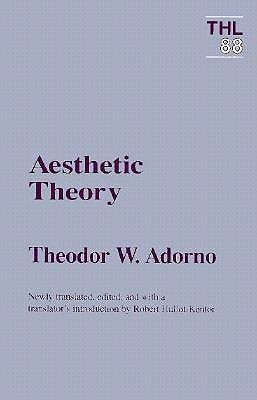26 August, 2024

- Difficult texts
- Barriers to access
I didn’t come by the online “anti-intellectualism” discourse[1] recently. My starting point with it was in undergrad, when the central and only assigned text in one of my film courses was Theodor Adorno’s Aesthetic Theory (AT). To this day, that work is one of, if not the densest text against which I’ve ever battled. I say “battle” and I say “against” because never before had I ever experienced reading as a fight.
I don’t claim to understand the book or any of Adorno’s arguments in their entirety. I don’t think I really ever truly chipped away at it strongly enough to reveal even a suggestion of transparency. Instead, the thing I took away from it that I still feel today is the fighting.
✾ ✾ ✾
Those who have taken a peek at AT know the minimal formatting of the book (at least the University of Minnesota Press edition, pictured above). One wouldn’t know there were sections to the book if it weren’t for the presence of a similarly minimal table of contents. There are no chapter breaks, no chapter titles; there are, however, near-indiscernible single-space paragraph breaks to signal the beginning of the next topic.
The book consists of walls of text in form and in content.
✾ ✾ ✾
Adorno does not write simply.
Sentences whirl around themselves. There are references to other philosophers, composers, even phrases in Greek that provide no translation. Antecedents get lost after the second, third, fourth clause in one breathless statement.
It’s one of my favourite books.
✾ ✾ ✾
As I battled through every week of class, straining to finish the assigned ten to twenty page section that would take me a cumulative five to seven hours just to read (let alone reflect), I remember asking a friend in a different program of study if he had any thoughts on “difficult” texts, specifically by way of language.
He raised a straightforward point I hadn’t previously considered: texts that are hard to get through present an issue of access. “What is the point of your work if no one can read it or understand your argument?”
I let this question tumble around my head for a bit before I headed to my professor’s office early in the term. Once I was seated and we had been talking for a bit a new question materialized, one I didn’t realize was the crux of my ambivalent fascination with AT.
“Why do you think Adorno has presented his work like this?” I asked. Why so opaque? Why so seemingly insurmountable?
I don’t remember what he said exactly, but my professor did rock my world by asking me in turn: How do you think the text’s form affects the writer’s arguments? In other words, what would it mean if it were difficult, so frustratingly opaque, on purpose? What can you make of its contents by way of its form?
This reframed the text entirely for me. No longer was it hostile. No longer was it fighting me as its antagonist, wall after seemingly unreadable wall of text. In fact, I wasn’t even in the picture. It was, by way of its form, creating its own autonomy. (This in itself is a central concept of AT that I really can’t get into right now!!)
And thus continued the exacting labour of parsing through AT. During seminars, different classmates hoisted different meanings out of its infinite well. For those similarly enthralled as I, it was a time of exciting rigour and pure generation. The difficult text demanded hard work, and the hard work proved to be worthwhile and rewarding.
Now, back to my friend’s point of barriers to access. Was the difficulty of Adorno’s work truly a barrier, or was its difficulty part of its rhetoric, its identity? Now, towards the reader and a bit more abstractly: what becomes of one’s threshold for difficulty if one disengages with the immediately challenging?
I don’t entirely disagree with my friend. I do think that the more dense a text’s language, the more “inaccessible,” the fewer readers it will have. Difficult texts demand of the reader precious resources: time and attention. The typical undergraduate student can expect to spend most of their time being a student: studying, attending class, doing coursework. Working adults in non-academic, non-writing professions: less so.
✾ ✾ ✾
The central issue though is knowing one’s audience and the objective of the text. AT is a work of philosophy. Immanent to such a field of writing are the demands it requires upon the reader. Pioneering philosophical ideas may work with simplified language but would do so at a disadvantage. Nuanced, complex ideas are buttressed by nuanced, complex writing. It wouldn’t do for the writer of a children’s grammar book, for example, to take the same approach.
Difficulty in this way has been conflated with entitlement, all further aggravated by economies of attention. Are we entitled to frictionlessness? Must all things be immediately accessible, immediately enjoyable? Have we been trained by our digital diet to crave that which satiates instantly?
And is anything that goes against this, anything that requires more of us, anything fighting with friction, battling against us?
✾ ✾ ✾
Next up:
- “let people enjoy things”
- dismissal - a weapon
- what we like is who we are
August 2024
Footnotes:
1. My starting point for these current reflections are Mina Le's substack post on elitism, Feed Me's "Machine in the Garden" post Le links in that substack post, and the "is booktok ruining reading?" online discourse as a whole.